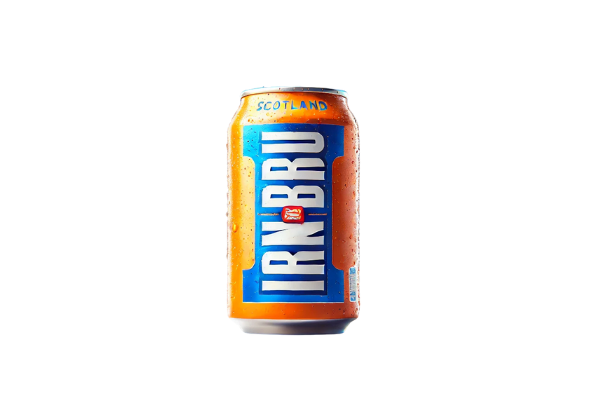History:
Irn-Bru was first launched in 1901 under the name “Iron Brew” by A.G. Barr, a soft drink company founded in 1875 in Falkirk, Scotland. It was created as a refreshing and revitalizing drink for workers, especially those in heavy industries like steel and iron manufacturing, who needed an energy boost during their physically demanding jobs. The original name “Iron Brew” was a nod to its supposed iron content, which was promoted as a health benefit at the time.
In 1946, the name was changed to “Irn-Bru” due to labelling regulations that required products to be named according to their actual production methods. Since the drink wasn’t brewed in the traditional sense, the spelling was altered to “Irn-Bru,” a distinctive and iconic rebranding.
Flavour and Ingredients:
Irn-Bru’s flavour is difficult to categorise, as it doesn’t taste like any other soft drink. It’s often described as sweet, slightly tangy, and somewhat fruity, with hints of citrus and bubblegum. The flavour is unique and instantly recognizable, though some describe it as “medicinal” due to its complex blend of flavours.
The exact recipe of Irn-Bru is a closely guarded secret, but it is known to contain carbonated water, sugar, caffeine, and a variety of flavourings, including quinine. It also has 32 different flavouring ingredients and has historically included ammonium ferric citrate, which contributed to its association with iron.
Cultural Significance:
Irn-Bru is more than just a soft drink in Scotland – it is a cultural symbol. It is often humorously referred to as a “hangover cure” due to its high sugar content and the caffeine boost it provides, making it a popular choice after a night of drinking. Irn-Bru is also widely associated with Scottish identity and pride, and many Scots view it as an essential part of their daily lives.
For years, Irn-Bru was one of the few soft drinks to outsell Coca-Cola in any country, making it a notable exception in the global soft drink market.
Marketing and Branding:
Irn-Bru is well-known for its humorous and often edgy advertising campaigns. Its ads have frequently played on Scottish identity, humour, and irreverence. The brand’s slogans, such as “Made in Scotland from Girders,” emphasize the drink’s strong and bold image, even though the “iron” content is more symbolic than literal.
Irn-Bru’s marketing has occasionally stirred controversy due to its provocative and tongue-in-cheek nature, but this only added to its cult status. The brand has also embraced its iconic orange colour and quirky reputation, often using it to stand out in a crowded soft drink market.
The 2018 Recipe Change:
In 2018, Irn-Bru reduced its sugar content by over 50% to comply with the UK government’s sugar tax on soft drinks, which was introduced to combat rising obesity rates. The reformulation prompted a strong reaction from many fans, who felt that the new version lacked the same sweetness and depth of flavour as the original. Some even began stockpiling the original recipe before the change took place. Despite the backlash, Irn-Bru remains popular, though the debate over the “new” versus “old” recipe continues.
Variants:
Over the years, several variations of Irn-Bru have been introduced, including:
- Irn-Bru Sugar-Free: A diet version of the drink, launched to offer a low-calorie alternative without sacrificing too much flavour.
- Irn-Bru Xtra: A sugar-free version with a stronger flavour profile, launched in 2016.
- Limited Editions: Occasionally, special limited-edition flavours are released, often coinciding with particular events or holidays.
Irn-Bru Around the World:
Although Irn-Bru is most strongly associated with Scotland, it is also exported to many countries around the world, particularly where there are large Scottish expatriate communities, such as Canada, Australia, and the United States. It has gained a loyal following beyond Scotland, with some fans discovering it as a quirky alternative to more mainstream soft drinks.
Despite its Scottish roots, Irn-Bru has become a symbol of the country’s creativity and resilience, cherished by generations and continuing to be a drink that embodies Scottish identity.


